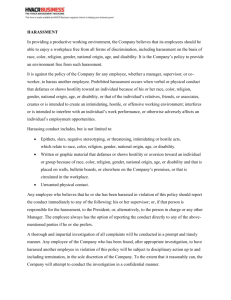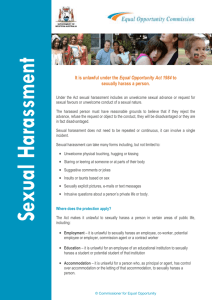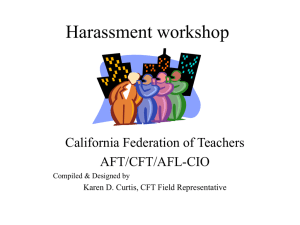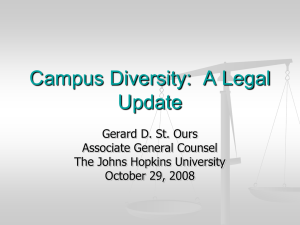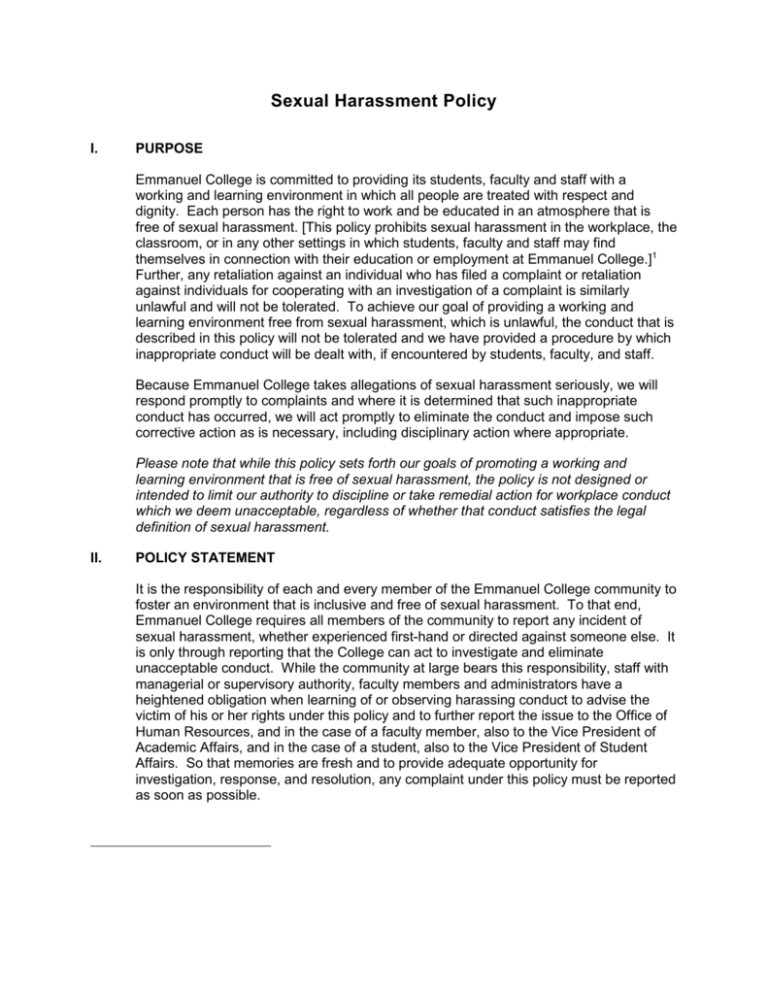
Sexual Harassment Policy
I.
PURPOSE
Emmanuel College is committed to providing its students, faculty and staff with a
working and learning environment in which all people are treated with respect and
dignity. Each person has the right to work and be educated in an atmosphere that is
free of sexual harassment. [This policy prohibits sexual harassment in the workplace, the
classroom, or in any other settings in which students, faculty and staff may find
themselves in connection with their education or employment at Emmanuel College.]1
Further, any retaliation against an individual who has filed a complaint or retaliation
against individuals for cooperating with an investigation of a complaint is similarly
unlawful and will not be tolerated. To achieve our goal of providing a working and
learning environment free from sexual harassment, which is unlawful, the conduct that is
described in this policy will not be tolerated and we have provided a procedure by which
inappropriate conduct will be dealt with, if encountered by students, faculty, and staff.
Because Emmanuel College takes allegations of sexual harassment seriously, we will
respond promptly to complaints and where it is determined that such inappropriate
conduct has occurred, we will act promptly to eliminate the conduct and impose such
corrective action as is necessary, including disciplinary action where appropriate.
Please note that while this policy sets forth our goals of promoting a working and
learning environment that is free of sexual harassment, the policy is not designed or
intended to limit our authority to discipline or take remedial action for workplace conduct
which we deem unacceptable, regardless of whether that conduct satisfies the legal
definition of sexual harassment.
II.
POLICY STATEMENT
It is the responsibility of each and every member of the Emmanuel College community to
foster an environment that is inclusive and free of sexual harassment. To that end,
Emmanuel College requires all members of the community to report any incident of
sexual harassment, whether experienced first-hand or directed against someone else. It
is only through reporting that the College can act to investigate and eliminate
unacceptable conduct. While the community at large bears this responsibility, staff with
managerial or supervisory authority, faculty members and administrators have a
heightened obligation when learning of or observing harassing conduct to advise the
victim of his or her rights under this policy and to further report the issue to the Office of
Human Resources, and in the case of a faculty member, also to the Vice President of
Academic Affairs, and in the case of a student, also to the Vice President of Student
Affairs. So that memories are fresh and to provide adequate opportunity for
investigation, response, and resolution, any complaint under this policy must be reported
as soon as possible.
III.
SCOPE
This policy applies to all current faculty, staff and students.
IV.
DEFINITION OF SEXUAL AND DISCRIMINATORY HARASSMENT
In Massachusetts, the legal definition for sexual harassment is this:
“sexual harassment” means sexual advances, requests for sexual favors, and verbal or
physical conduct of a sexual nature when:
1.
Submission to or rejection of such advances, requests or conduct is made
either explicitly or implicitly a term or condition of employment or as a
basis for employment decisions; or
2.
Such advances, requests or conduct have the purpose or effect of
unreasonably interfering with an individual’s work performance by
creating an intimidating, hostile, humiliating or, sexually offensive work
environment.
Under these definitions, direct or implied requests by a supervisor for sexual favors in
exchange for actual or promised job benefits such as favorable reviews, salary
increases, promotions, increased benefits, or continued employment constitutes sexual
harassment. The legal definition of sexual harassment is broad and in addition to the
above examples, other sexually oriented conduct, whether it is intended or not, that is
unwelcome and has the effect of creating a work place environment that is hostile,
offensive, intimidating, or humiliating to male or female workers may also constitute
sexual harassment.
While it is not possible to list all those additional circumstances that may constitute
sexual harassment, the following are some examples of conduct that may violate the
College’s policy against sexual harassment, whether or not it constitutes sexual
harassment under the law:
Unwelcome sexual advances - whether they involve physical touching or
not;
Sexual epithets, jokes, written or oral references to sexual conduct,
gossip regarding one’s sex life;
Comment on an individual’s body, comment about an individual’s sexual
activity, deficiencies, or prowess;
Displaying sexually suggestive objects, pictures, cartoons;
Unwelcome leering, whistling, touching, brushing against the body, sexual
gestures, suggestive or insulting comments;
Inquiries into one’s sexual experiences; and,
Discussion of one’s sexual activities.
All employees should take special note that, as stated above, retaliation against an individual
who has complained about sexual harassment, and retaliation against individuals for
cooperating with an investigation of a sexual harassment complaint is unlawful and will not be
tolerated by the College.
V.
PROCEDURES
If any of our employees believes that he or she has been subjected to sexual
harassment, the employee has the right to file a complaint with our organization. This
may be done in writing or orally.
If you would like to file a complaint you may do so by contacting the Director of Human
Resources, the Associate Director of Human Resources, the Vice President of Student
Affairs or the Vice President for Academic Affairs at Emmanuel College, 400 The
Fenway, Boston, MA 02115. All of these persons may be reached by contacting 617735-9991. These persons are also available to discuss any concerns you may have and
to provide information to you about the Colleges’ policy on harassment and
discrimination and our complaint process.
VI.
INVESTIGATION
When a complaint is received, the allegation will be promptly investigated in a fair and
expeditious manner. The investigation will be conducted in such a way as to maintain
confidentiality to the extent practicable under the circumstances. The investigation will
include a private interview with the person filing the complaint and with witnesses. The
person alleged to have committed sexual harassment will also be interviewed. When the
investigation has been completed, the College will, to the extent appropriate, inform the
person filing the complaint and the person alleged to have committed the conduct of the
results of that investigation.
If it is determined that inappropriate conduct has occurred, we will act promptly to
eliminate the offending conduct, and where it is appropriate we will also impose
disciplinary action.
VII.
DISIPLINARY ACTION
If it is determined that inappropriate conduct has been committed by a College
employee, such action as is appropriate under the circumstances will be taken. Such
action may range from counseling to termination from employment, and may include
such other forms of disciplinary action as deemed appropriate under the circumstances.
VIII.
STATE AND FEDERAL REMEDIES
In addition to the above, if an employee believes that he/she has been subjected to
sexual harassment, the employee may file a formal complaint with either or both of the
government agencies set forth below. Using Emmanuel College’s complaint process
does not prohibit an employee from filing a complaint with these agencies. Each of the
agencies has a short time period for filing a claim (EEOC - 300 days; MCAD – 300
days).
1.
The United States Equal Employment Opportunity Commission (EEOC)
John F. Kennedy Federal Building
475 Government Center
Boston, MA 02203
Phone: 1-800-669-4000
Fax: 617-565-3196
TTY: 1-800-669-6820
http://www.eeoc.gov/
2.
The Massachusetts Commission Against Discrimination (MCAD)
Boston Office
One Ashburton Place – Room 601
Boston, MA 02108
(617) 727-3990
Springfield Office
424 Dwight Street, Room 220
Springfield, MA 01103
(413) 739-2145
http://www.mass.gov/mcad/




